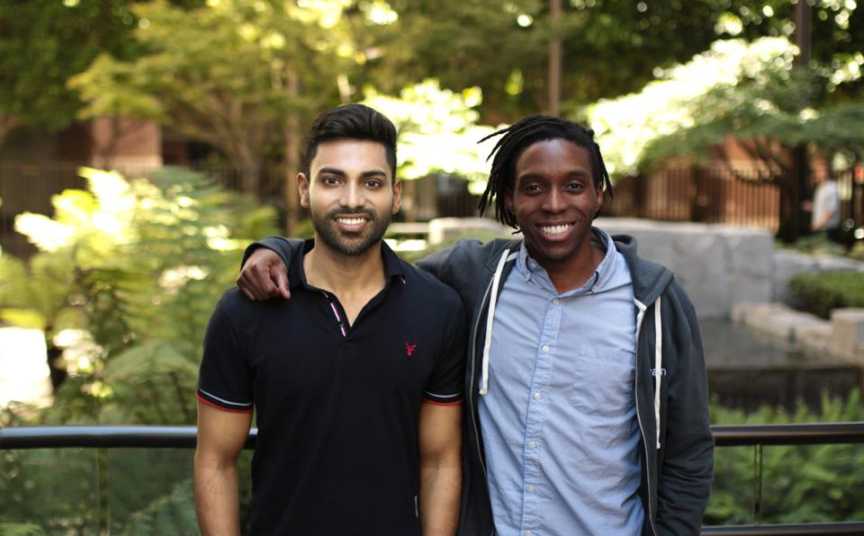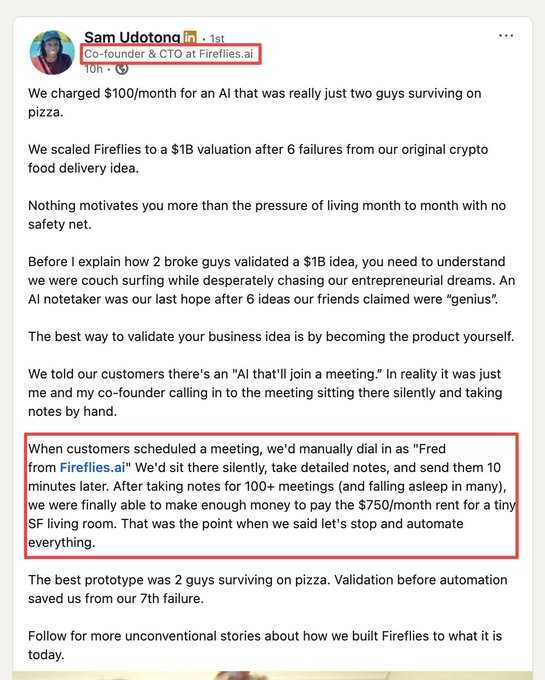This $1 billion AI startup founded by an MIT alum claimed to use AI, but its “AI” was just two founders taking notes by hand

The launch of ChatGPT in late 2022 ignited one of the biggest funding frenzies in tech history. Ever since, investors have been pouring billions of dollars into startups — as long as they have the word “AI” in their names. The momentum feels eerily similar to the early 2000s dot-com boom, when any company with a “.com” domain could raise capital overnight.
The latest example comes from Fireflies.ai, an AI-powered meeting assistant now valued at $1 billion. But in a twist that perfectly captures the current hype cycle, the company’s original “AI” wasn’t powered by algorithms at all — it was powered by its founders.
Before the company built its now-famous voice-to-text engine, Fireflies’ so-called “AI assistant” was literally just two founders joining meetings, taking notes by hand, and sending summaries manually — all while telling customers the product was automated.
How It Started
The story comes straight from MIT alum Sam Udotong, Fireflies’ co-founder and CTO, who recently shared the company’s humble beginnings in a viral LinkedIn post. Long before investors lined up to back “AI-powered” meeting tools, Udotong and his co-founder Krish Ramineni were just two broke founders trying to validate an idea — any idea — that people would actually pay for.
They had already gone through six failed startups, including one involving crypto food delivery. But when they pitched Fireflies — a virtual assistant that could join meetings, take notes, and summarize conversations automatically — something finally clicked. People were willing to pay $100 a month for it.
The only problem? There was no AI.
When a customer booked a demo, one of the founders would quietly join the meeting under the name Fred from Fireflies.ai, listen in, take notes by hand, and send a polished summary 10 minutes later. For weeks, they did this dozens of times — often staying up all night to “automate” meetings by hand.
“We told our customers there’s an “AI that’ll join a meeting,” Sam later admitted. “In reality it was just me and my co-founder calling in to the meeting sitting there silently and taking notes by hand.”
The experiment worked. It proved that people hated taking notes — and would gladly pay someone (or something) to do it for them.
“When customers scheduled a meeting, we’d manually dial in as “Fred from Fireflies.ai” We’d sit there silently, take detailed notes, and send them 10 minutes later. After taking notes for 100+ meetings (and falling asleep in many), we were finally able to make enough money to pay the $750/month rent for a tiny SF living room. That was the point when we said let’s stop and automate everything, in 2017. Since then, security, privacy, and data protection became foundational to everything we built (see my other posts).”
The Turning Point
After manually “powering” their fake AI for weeks, the founders had their validation — real users were paying for something that didn’t even exist yet. That insight became the foundation for what would eventually grow into one of the most widely used AI meeting assistants in the world.
With enough revenue to cover their $750 San Francisco rent and a few late-night pizzas, Sam and Krish finally turned their human-powered prototype into real software. They began automating the note-taking process using speech recognition models, first with open-source tools, then with custom algorithms that could identify speakers, summarize conversations, and store meeting transcripts automatically.
As Fireflies started to gain traction, the company caught the attention of investors. The team’s deep understanding of customer pain points — earned from manually doing the job themselves — became their moat. It wasn’t just another AI tool chasing hype; it was a product shaped by firsthand experience.
Over time, Fireflies transformed from two exhausted founders pretending to be AI into a billion-dollar platform that genuinely uses artificial intelligence to help teams remember and act on what was said in meetings.
Lesson For Founders
Fireflies’ story is more than a funny startup anecdote — it’s a blueprint for how real founders validate ideas in an era obsessed with buzzwords. Long before raising money or writing code, they proved that people wanted what they were selling.
In many ways, the company’s scrappy beginnings highlight a growing tension in today’s AI gold rush. Investors are writing billion-dollar checks to anything with “AI” in its name, while the most successful founders are still doing what entrepreneurs have always done — finding pain points and solving them, even if it means faking the automation at first.
The irony is that Fireflies’ fake AI turned into one of the most successful real AI products of its kind. What started as two founders taking notes by hand evolved into a platform trusted by millions to record, transcribe, and summarize meetings automatically.
As Udotong later reflected, the early deception wasn’t about dishonesty — it was about validation.
“The best way to validate your business idea,” he said, “is by becoming the product yourself.”
In the end, that’s the real takeaway: great startups don’t start with code — they start with conviction.
The Debate
Not everyone on X saw the story as a clever example of startup hustle. Some users argued that Fireflies’ early approach — manually joining calls while claiming to use AI — crossed an ethical line.
One X user wrote:
“Yeah this was misrepresentation, fraud, and violating a ton of GDPR (which requires lawful, transparent processing), cross-border data transfer laws, and confidentiality, if not disclosed to those customers upfront. This is not the flex you think it is.”
However, Fireflies co-founder Sam Udotong later clarified that this was taken out of context. He said the manual note-taking happened only in 2017, during early beta testing, and that the team had been transparent with users about having “a human in the loop.”
“This was for a few beta customers from 2017 and we made it clear that there was a human in the loop of the service. LLMs didn’t exist yet. It’s like offering an EA for $100/mo, but it wasn’t scalable. We stopped and then built from scratch,” Udotong explained.
Others, however, defended the founders, saying that early-stage validation often involves “manual automation” — a common way to test demand before investing in technology.
The debate reflects a larger tension in the startup world: where does scrappy validation end and misrepresentation begin?
Closing
In an age where investors chase anything labeled “AI,” Fireflies’ journey is a reminder that true innovation often begins without it. While hype fuels headlines, it’s still human grit, not algorithms, that turns ideas into billion-dollar realities.





